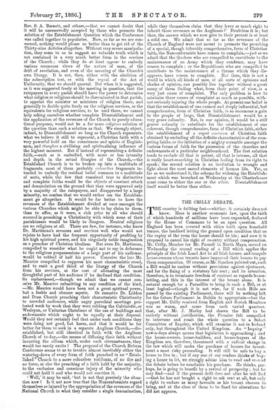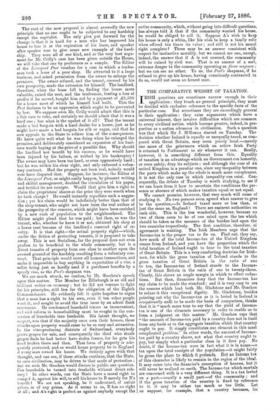THE CHILLY DEBATE.
THE country is drifting fast—whither, it certainly does not know. Here is Another economic law, upon the faith of which hundreds of millions have been expended, declared by the House of Commons to be an open question. All England has been covered with cities built upon leasehold tenure, the landlord letting the ground upon condition that on the expiry of the term the house should be his ; and now it is proposed to cancel his right of re-entry without compensation. Mr. Crilly, Member for Mr. Parnell in North Mayo, moved on Wednesday the second reading of a Bill which applies the principle of the Irish Land Act to all Irish houses, and compels house-owners whose tenants have improved their houses to pay them compensation. Of course, as Mr. Goschen pointed out, such a Bill would be useless without provisions against ejectment, and for the fixing of a statutory fair rent ; and its intention, therefore, is to terminate freedom of contract as regards house- letting, and this in the interest of the tenant alone. It is natural enough for a Parnellite to bring in such a Bill, or at least logical—though it is not wise, for if each Bills are passed by the existing Parliament, there will be nothing left for the future Parliament in Dublin to appropriate—but the support Mr. Crilly received from English and Scotch Members was so warm, and came from such varied quarters, that, after Mr. J. Morley had shown the Bill to be entirely without justification, the Premier felt compelled to intervene and remit the whole question to a Select Committee of Inquiry, which will examine it not in Ireland only, but throughout the United Kingdom. An " Inquiry " now-a-days always means that legislation is approaching ; and the house-owners, house-builders, and house-buyers of the Kingdom are, therefore, threatened with a radical change in the law which will make the purchase of houses for invest- ment a most risky proceeding. It will still be safe to buy a house to live in ; but if any one of our readers thinks of buy- ing a house to let, we strongly advise him to read and re-read the debate before he concludes his purchase. He thinks, per- haps, he is going to benefit by a revival of prosperity ; but he may find—and if the present drift does not alter he will find —that he has not bought a right to ask rent at all, but only a right to endure as many lawsuits as his tenant chooses to bring, and at the close of them to be fined for alterations he did not approve.
The root of the new proposal is almost avowedly the new principle that no one ought to be subjected to any hardship except the capitalist. The only plea put forward for the change is that it is hard for a man who has improved his house to lose it at the expiration of his lease, and speaker after speaker rose to give some new example of the hard- ship. They were all of one kind, and as the very best argu- ment for Mr. Crilly's case has been given outside the House, we will take that one by preference as a sample. The Editor of the Liverpool Post vouches for a case in which a trades- man took a lease of a poor shop. He attracted to it a large business, and asked permission from the owner to enlarge the premises. The owner refused, and the tenant, coerced by his own prosperity, made the extension for himself. The landlord, therefore, when the lease fell in, finding the house more valuable, raised the rent, and the tradesman, fearing a loss of profits if be moved, bought him out by a payment of £1,500 for a house most of which he himself had built. This the Post declares to be an oppression which ought to be prevented by law. We suppose even Mr. Crilly would admit that this is a fair case to take, and certainly we should admit that it was a hard one ; but what is the upshot of it all ? That the tenant made a bad bargain with a hard dealer for a house, just as he might have made a bad bargain for silk or sugar, and that he now appeals to the State to relieve him of the consequences. He knew quite well what he was doing when he enlarged the premises, and deliberately considered an expansion of his busi- ness worth buying at the price of a possible fine. Why should the landlord not benefit by his success, as he would have been injured by his failure, or robbed by his bankruptcy ? The owner may have been too hard, or even oppressively hard ; but he was within his clear right, and only enforced a volun- tary contract. Had the property not been real, nobody would ever have disputed that. Suppose for instance, the Editor of the Liverpool Post, as might easily happen, by pleasant writing and skilful management, doubled the circulation of his paper, and trebled its net receipts. Would that give him a right to claim the proprietors' shares at the price they were worth when he took charge ? He would instantly repudiate such a sugges- tion • yet his claim would be indefinitely better than that of the sop-tenant, who might not have been the real author of the prosperity of the concern, which might have been enriched by a new rush of population to the neighbourhood. The Editor might plead that he was paid ; but then, so was the tenant, who, whether he knew it or not, obtained his shop at a lower rent because of the landlord's reserved right of re- entry. It is that right—the actual property right—which, under the fiction of protecting tenants, it is proposed to take away. This is not Socialism, for the proposal does not even profess to be beneficial to the whole community, but is a direct transfer of property from one class to another upon the avowed ground of the hardship resulting from a voluntary con- tract. That principle would cover all human transactions, and make it impossible to buy anything in expectation of a rise, a seller being just as hardly used if a purchaser benefits by a speedy rise, as the Post's shopman was.
We are much struck, we confess, by Mr. Goschen's speech upon this matter. The Member for Edinburgh is an old and brilliant writer on economy ; but he did not venture to fight for his principles, still less for the obligation of the Eighth Commandment. He evidently felt it quite hopeless to argue that a man has a right to his own, even if ten other people want it, and sought to avoid the true issue by an adroit flank movement. He condemned leasehold tenure as inconvenient, an I said reform in honsebuilding must be sought in the con- version of leaseholds into freeholds. His latent thought, we suspect, was that if the majority once own their houses, these attacks upon property would cease to be so easy and attractive.
In the vine-producing districts of Switzerland, everybody grows grapes for sale, and consequently the thief who steals grapes finds he had better have stolen francs, for he gets his head broken there and then. That form of property is ade- quately protected, and so would house property be in England if every man owned his house. We entirely agree with that
thought, and can see, if these attacks continue, that the State, to save civilisation, may be driven to that mode of protection ;
but we wish Mr. Goschen would discuss in public one question.
Can leaseholds be turned into freeholds without direct rob- bery? In other words, can the State have a moral right to compel A, against his will, to sell his house to B merely for B's benefit ? We are not speaking, be it understood, of unfair prices, or of any prices. As it seems to us, B has no right at all ; and A's right is perfect as against anybody except the
entire community, which, without going into difficult questions, has always told A that if the community wanted his house, he would be obliged to sell it. Suppose A's wish to keep his house is only a whim, like his wish to keep a family relic when offered ten times its value ; and still is not his moral right complete ? There may be an answer consistent with respect for instinctive morality, but we cannot see one, except, indeed, the answer that if A is not coerced, the community will be ruined by civil war. That is an answer of a sort, extreme danger to the community operating as force majeure ; but we can see no other. To us, the Post's shopman, if he refused to give up his house, having consciously contracted to do so, would not seem an honest man.



































 Previous page
Previous page